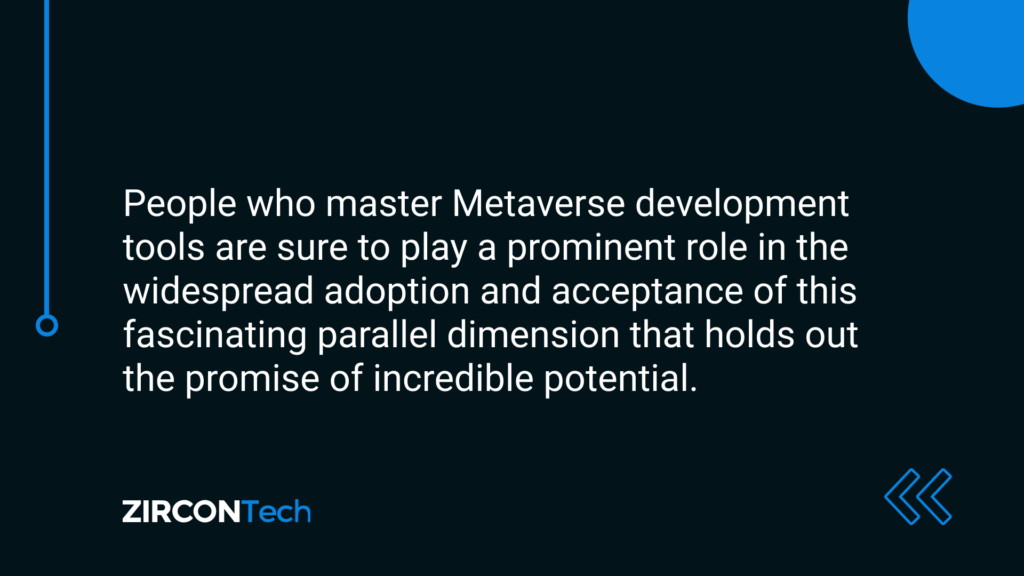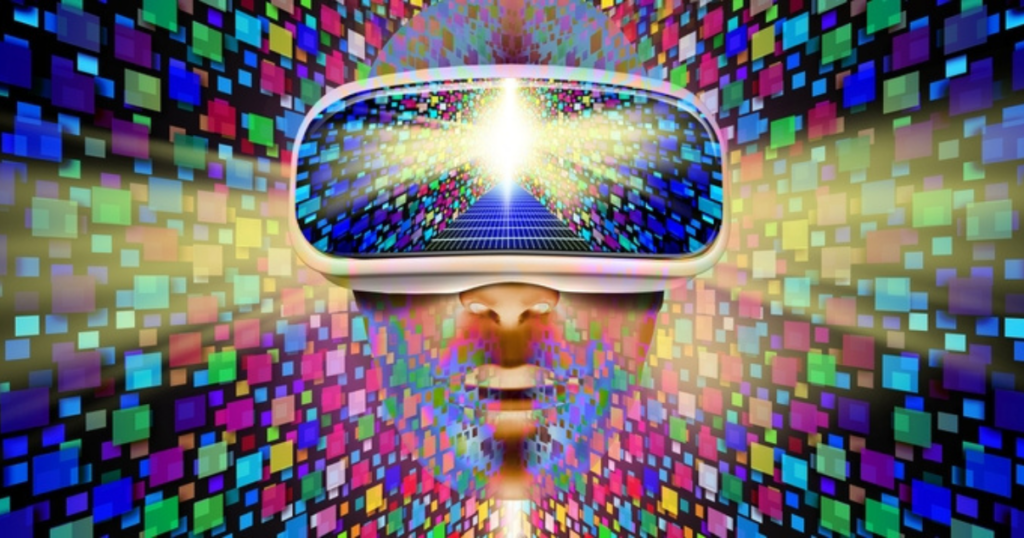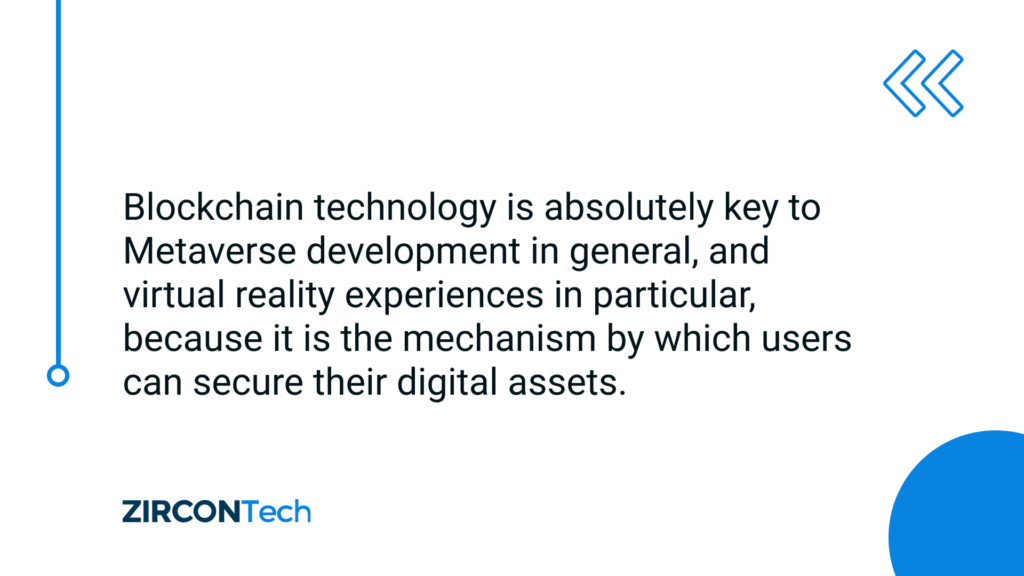The world is still waiting for a crisp, clear and simple definition of the Metaverse. One reason for that is that the Metaverse is a diverse, sprawling and ever-evolving concept. A wide range of metaverse development tools are now needed.
What we can agree on, however, is that the Metaverse is a catch-all name for a new, exciting and immersive digital dimension that brings with it a wealth of possibilities for commercial enterprises in the coming years.One of the most prominent sectors involved in the creation of this new digital reality is that of Metaverse development.

So what does a Metaverse developer need to know? What will be involved in Metaverse development? And what Metaverse development tools will be most useful to people and companies working in this space?ZirconTech can answer all those questions, and more.
ZirconTech is the ideal partner for organizations contemplating digital transformation. As a result, we can provide consultancy services related to Metaverse blockchain technology specifically for developers.
What is Metaverse technology?
Ever since Mark Zuckerberg, the co-founder and CEO of Facebook, described his vision for the Metaverse in 2021, the term has become common currency – especially among people who spend their working or leisure time in and around the digital dimension.

The Metaverse has in some quarters become a blanket term for that digital realm, but in its purest form it focuses on the possibilities and experiences unlocked by virtual reality and augmented reality.
From the perspective of Metaverse development, it is essential to know whether or not it will be an open platform – like the web – or a sector dominated by one or two companies – like the world of mobile applications.
At this early stage, Metaverse development is all about creating experiences for one of several platforms. These include virtual reality systems such as HTC Vive and Oculus Quest. It also embraces the development tools needed to work in virtual worlds, like Fortnite and Roblox. Metaverse development tools can also be applied to mobile apps, as well as the web itself.
And those tools? There are, at this early stage in the evolution of the Metaverse, many to choose from. They include Amazon Sumerian, Unity, the Unreal Engine of Epic, Autodesk’s Maya, and the open source Blender. It will be intriguing to see if this degree of openness and interoperability persists over the coming years, or if one or two dominant platforms emerge.
It is fascinating to examine some of the early examples of Metaverse development to see their different take on how to best exploit this new opportunity. It is also possible to see how a Metaverse developer could apply new and existing skills to thrive in this evolving environment.Microsoft’s Metaverse Stack has its roots firmly in the real world, with apps on this platform underpinned by digital twins. That means a broad swathe of Metaverse development tools can be applied in this context. The same philosophy appears to apply at Nvidia’s Omniverse, which presents itself as the three-dimensional equivalent of a net browser. Facebook – renamed Meta, of course – also launched a Metaverse Product Group and it will be fascinating to see which direction its innovation moves in.
The role of the Metaverse developer
If you want to work in Metaverse development, or in specific areas such as Metaverse app development and Metaverse blockchain development, what tools and skills will you need to thrive? Obviously, the main attribute is the ability to create virtual worlds that deliver immersive, interactive and extremely realistic experiences.

Some of the skills that are needed for that task are rooted in traditional online innovation work, and use existing development tools. Others may require the acquisition of new capabilities. The most important Metaverse development skills are:
Programming: Any Metaverse developer will need a solid grounding and fluency in programming languages such as JavaScript, Python and Swift.
Software development: A Metaverse developer should be comfortable with the demands of software development. Even if you have a particular area of specialism, you should be adept in security practices, UI/UX development, and the use of specific API and third-party libraries.
3D modeling: Here’s where the Metaverse development skills become more closely aligned with the demands of the virtual world. You should be used to the demands of 3D modeling, given how fundamental the creation of such objects is to the level of realism required of the Metaverse. This represents a huge opportunity for the creative Metaverse developer.
Artificial Intelligence: AI technology is at the core of the Metaverse because it drives the ability of a virtual world to be responsive and interactive. A Metaverse developer should be fluent in the necessary programming language, such as Python, R and C++. You should also be comfortable with the need to work with deep learning algorithms and AI frameworks such as Pytorch, TensorFlow and Caffe. Check out our AI service in detail!
Virtual reality and augmented reality: As well as AI technology, a Metaverse developer will need proficiency in both VR and AR. The defining experience of the Metaverse is interaction with virtual spaces, and that experience needs to be as lifelike and immersive as possible. You should be comfortable with using platforms such as Oculus and HTC Vive, and with the ways they interact with VR headsets and other tech.
NFTs: A broad range of assets within the Metaverse, such as digital objects and avatars, can be minted as non-fungible tokens and sold between users using crypto currency. A Metaverse developer needs to be familiar with the systems and processes that surround NFTs, such as smart contracts, minting, and blockchain technology.
As with any profession, it is desirable if you have a genuine passion for the Metaverse, as well as the creativity to be able to deploy the skills above to the fullest effect.
Metaverse development tools
You have got the skills – now how can you use them? When it comes to the challenge of mastering Metaverse technology, there are certain tools that will give you great assistance in Metaverse development.
- Webaverse: This is ideal if you are a Metaverse developer with a particular fondness for open source. Indeed, the platform’s proud boast is that it wants to “transfer the power from a few giant tech firms to consumers and artists”. It provides a Metaverse engine that is completely open source, meaning anybody can use it to start creating.
- HyperCube: This is a piece of blockchain technology that is still in its early stages and proposes to underpin an environment of extended reality, which sounds a lot like the Metaverse.
- XREngine: Many experts see this as one of the most useful tools available when you are a Metaverse developer looking to start the creative process. It has set up a Metaverse development framework that combines an assortment of open-source tools. That means you can create audio, video and 3D designs effectively and easily.
- JanusWeb: This is an open-source programming platform for the Metaverse. The focus here is on the creation of 3D environments for web browsers – and many of the scenes you can come up with are eye-catchingly impressive.
- WebXR Device API: The objective here is to streamline the procedure whereby a Metaverse developer can directly access the hardware needed to create. It provides a standardized API that developers can use to get hold of VR and AR kit required to complete their projects.
- Open Metaverse Interoperability Group: Known more handily as OMI, this group aims to develop open standards in the hope that this will ensure that Metaverse development is open to everybody. Apps, services and platforms are all able to integrate to keep up to date with Metaverse resources.
- Blender: No list of this type would be complete without the name of one of the most venerable open-source projects. Its existence and popularity predate the widespread use of the term Metaverse, and this platform remains the top choice of many a Metaverse developer on a mission to create 3D environments.As you can see, if you are a Metaverse developer these tools can be used both on a strategic and a day-to-day basis to enhance your capabilities and the creations you are seeking to deliver.
The Metaverse and blockchain technology
It does not take much working out to see that there is a close relationship between blockchain technology and the Metaverse. Indeed, it would be difficult for the latter to exist without the former – although some major players in this space are attempting to do so.

The most obvious illustration of this is the exponential growth in the trading of non-fungible tokens. This is now a world-wide marketplace that epitomizes the ever-increasing appeal and relevance of the Metaverse – and that huge volume of traffic is underpinned by blockchain technology. This is what will guarantee the reliability of data in the Metaverse, at the same time as AI technology is used to create its rich content.
The extent to which the Metaverse and blockchain technology need each other has been the subject of extensive debate between experts in the field. One example discussed has been that of Second Life, a leading name in the Metaverse, which has more than 70 million registered accounts. Second Life has developed a robust economy that incorporates the trading of digital assets, a market place worth about half a billion dollars each year – and it does it all without using blockchain technology.
However, experts also feel that driving forward in Metaverse development without using a blockchain could be a strategy that opens the door for Big Tech to dominate the landscape – the very opposite of the freedom and decentralization that is supposed to be at the heart of the Metaverse.While the Metaverse remains a large, diverse and amorphous entity, there will always be a broad range of opinions over the relationship between it and blockchain technology. It will be fascinating to observe how the two interact and evolve alongside one another in the near future – and anyone involved in Metaverse development would be well advised to monitor that process.
How can ZirconTech assist your Metaverse development?
ZirconTech is a software development operator with extensive experience in many of the technologies that are critical to the ongoing Metaverse development that is so attractive to numerous organizations across the world.
Our bespoke solutions have driven digital transformation for a host of satisfied clients, and we specialize in areas including blockchain technology.
As a result, we are ideally placed to provide blockchain consultancy services, as part of our wider commitment to cutting-edge software development.If your organization is considering a move forward into Metaverse development and you want the assistance of an expert partner to ensure the successful deployment of your software development, contact ZirconTech now so that we can proceed together.